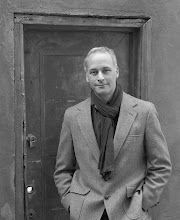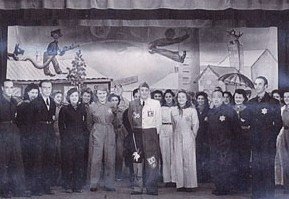SKETCHES AND SONGS IN "THE WESTERBORK SERENADE"
Die Westerbork Serenade, Johnny and Jones (1944), translated by Meiti Opie, adapted by David Natale,
Man without a Passport (Mench ohne Pass), Max Werner Lenz (1935), translated by Laurence Senelick
Oyfn Pripetshik (At The Fireplace), by Mark M. Warshawsky (1901),
“A flame burns in the fireplace, and the room warms up, as the teacher drills the children in the alef-beyz: Remember dear children, what you are learning here. Repeat it again and again: komets-alef is pronounced o.”
Magdeline, by Willy Rosen ('42 or '43), translated by Louis Dewijze and Annatina Luck, adapted by Natale
Wenn Ein Paketchen Kommt, by Willy Rosen (1943), translated by
Louis Dewijze and Jerry Silverman,
Rozhinkes Mit Mandlen (Raisins and Almonds), by Abraham Goldfaden (1880), “Under Yidele’s cradle is a snow white kid, the kid is destined for market, that will be your fate too, selling raisins and almonds…”
Die Dammenschue Von Zimmer No. 20, (The Lady’s Shoes from Chamber No.20) by Herbert and Rudolf Nelson (1939), translated by Luck, adapted by Natale,
“The Snag,” from “Sek,” by Conrad Tom (1931), translated by Senelick, adapted by Natale,
Das Bist Du, by Willy Rosen (1944), translated by Dewijze, adapted by Natale,
OOO-Oh Boom! Johnny and Jones (1938)
Ich Liebe Nur Die Heide (I love only the Heath), by Willy Rosen (1943)
“I love only the heath. Alone on the heath I can be happy.
Yes that is my wish. My soul rises as the sun laughs.”
Hatikva (The Hope), Israeli national anthem, by Naftali Herz Imber (1878)
“Our hope is not lost, our hope of two thousand years, to be a free nation in our land.”
Wenn Man Konnte Was Man Heimlich Wollte, (If One Could Do What One Secretly Wanted), by Willy Rosen (1944), translated by Dewijze, adapted by Natale;
Immer Langsam (Take it Slowly), by Willy Rosen (1943), translated by Dewijze, adapted by Natale
Monday, March 24, 2008
Sunday, March 16, 2008
Westerbork Serenade Program Notes
“One always has the feeling here of being the ears and eyes of a piece of Jewish history…We must keep one and other in touch with everything that happens…each one contributing his own little piece of stone to the great mosaic that will take shape once the war is over.”
Etty Hillesum, a Letter from Westerbork, 24 August 1943
I first visited the tragedy of Westerbork for my MFA thesis project at the Old Globe Theatre in 1996. It seemed the perfect acting exercise. But, as I began to work, the story took on a life of its own. Westerbork grabbed me by the sleeve and led me past hellish gates. People approached me from all sides and the story began to tell itself.
I performed a version for the first NYC Fringe festival in 1998. From this production I received some press and was contacted by more survivors who had actually been in the shows at Westerbork. After I heard their stories I was inspired to expand the piece more.
In 2006, with support and urging from my colleagues in the Theatre Artists Alliance, I came back to Westerbork yet again and was awarded a staged reading at the Annex Theatre. For the reading I had many people play the parts. It was informative to have the characters actually talk back to each other and to have other actors interpret the roles. One day I would like to see a production with a full cast and orchestra.
Why keep coming back to The Westerbork Serenade again and again? Because as the World War Two generation begins to pass away we must continue to piece together the puzzle and face some vital questions: How do the events of more than sixty years ago still directly affect Jews today with regard to religion, Israel and Palestine, and how we view ourselves as a people. What is racism and why does it make ordinary human beings behave like monsters? How are we in the US today similar to the people of Nazi Germany?
Finally, as an artist, it is very compelling to me to explore what it is to perform for one’s life. What does it feel like to be forced to use one’s creative essence and artistic skill in order to literally continue to exist? It seems to me the ultimate ironic twist to the notion that art fulfills our souls. In a most jarring way, this idea brings home the madness of the Holocaust.
Etty Hillesum, a Letter from Westerbork, 24 August 1943
I first visited the tragedy of Westerbork for my MFA thesis project at the Old Globe Theatre in 1996. It seemed the perfect acting exercise. But, as I began to work, the story took on a life of its own. Westerbork grabbed me by the sleeve and led me past hellish gates. People approached me from all sides and the story began to tell itself.
I performed a version for the first NYC Fringe festival in 1998. From this production I received some press and was contacted by more survivors who had actually been in the shows at Westerbork. After I heard their stories I was inspired to expand the piece more.
In 2006, with support and urging from my colleagues in the Theatre Artists Alliance, I came back to Westerbork yet again and was awarded a staged reading at the Annex Theatre. For the reading I had many people play the parts. It was informative to have the characters actually talk back to each other and to have other actors interpret the roles. One day I would like to see a production with a full cast and orchestra.
Why keep coming back to The Westerbork Serenade again and again? Because as the World War Two generation begins to pass away we must continue to piece together the puzzle and face some vital questions: How do the events of more than sixty years ago still directly affect Jews today with regard to religion, Israel and Palestine, and how we view ourselves as a people. What is racism and why does it make ordinary human beings behave like monsters? How are we in the US today similar to the people of Nazi Germany?
Finally, as an artist, it is very compelling to me to explore what it is to perform for one’s life. What does it feel like to be forced to use one’s creative essence and artistic skill in order to literally continue to exist? It seems to me the ultimate ironic twist to the notion that art fulfills our souls. In a most jarring way, this idea brings home the madness of the Holocaust.
Subscribe to:
Posts (Atom)


